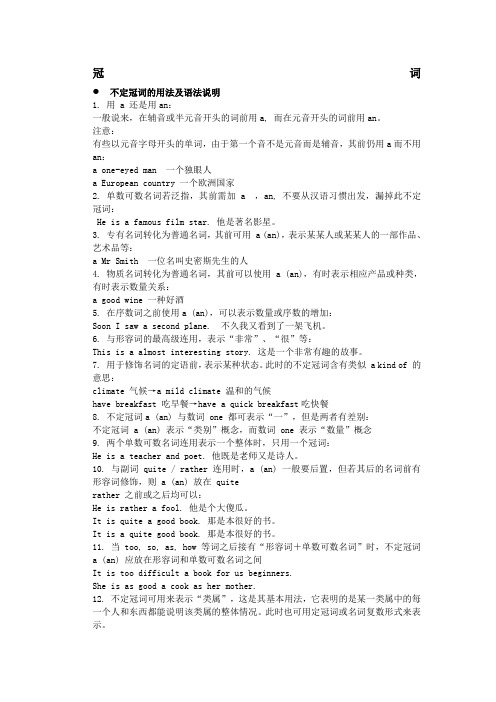第二讲 冠词、介词短语.doc
完整word版本英语中所有的介词及介词短语.docx

英语中所有的介词和介词短语1)at once 立刻2)at last 最后3)at first 起先,首先4)at the age of⋯在⋯⋯5)at the end of⋯在⋯⋯之末6)at the beginning of在⋯⋯⋯之初7)at the foot of在⋯⋯⋯脚下8) at the same time同9) at night / noon在夜里 / 中午10)with one's help 在某人的帮助下,由于某人的帮助11) with the help of在⋯⋯⋯的帮助下12) with a smile面笑容13) with one's own eyes眼看14) after a while了一会儿15) from now on从在起16) from then on从那起17) far example例如18) far away from离19) from morning till night从早到晚20)by and by 不久21)by air mail 寄航空件22) by bike / air / train / bus 自行 / 乘机 / 火 / 汽23) by ordinary mail寄平信24) by the way便25) by the window在窗26) by the end of⋯到⋯⋯ 底止27) little by little逐地1.表示的介及介短28) in all共29) in fact事上30) in one's twenties在某人二十几31) in a hurry匆忙32) in the middle of在⋯⋯ 中33) in no time (in a minute)立刻,很快34) in time (on time)及35) in public公众,公开地36) in order to了⋯⋯37)in front of 在⋯⋯前面38)in the sun 在阳光下39)in the end 最后,于40)in surprise 惊奇地41)in turn 依次42)of course 当然43)a bit (of) 有一点儿44)a lot of 多45)a little 一点儿46)on one's way to 某人在去⋯⋯的路上47)on foot 步行,走路48)a talk on space 一个关于太空的告49) on the other hand另一方面50) at / on the weekend在周末51) on the left (right) 在左 (右)52) on the other side of在⋯⋯另一53)on the radio 通收音机 (无广播 )54)to one's joy 使⋯⋯高的是55) to one's surprise使⋯⋯惊的是in,at,on ,before ,after ,till,since ,for ,from ,to,until , by ,in the middle of ,at the beginning of,at the end of ,at half past five ,at night ,in a week ,in the morning ,in class ,at sunrise , in spring / summer / autumn / winter ,on Sunday ,on Saturday afternoon ,on a winter evening , for a long time ,for two months , after school , since liberation ,before lunch ,at the time of , at the age of 。
冠词名词 代词形容词 副词 介词的知识点

冠词不定冠词的用法及语法说明1. 用 a 还是用an:一般说来,在辅音或半元音开头的词前用a, 而在元音开头的词前用an。
注意:有些以元音字母开头的单词,由于第一个音不是元音而是辅音,其前仍用a而不用an:a one-eyed man 一个独眼人a European country 一个欧洲国家2. 单数可数名词若泛指,其前需加 a ,an, 不要从汉语习惯出发,漏掉此不定冠词:He is a famous film star. 他是著名影星。
3. 专有名词转化为普通名词,其前可用 a (an),表示某某人或某某人的一部作品、艺术品等:a Mr Smith 一位名叫史密斯先生的人4. 物质名词转化为普通名词,其前可以使用 a (an),有时表示相应产品或种类,有时表示数量关系:a good wine 一种好酒5. 在序数词之前使用a (an),可以表示数量或序数的增加:Soon I saw a second plane. 不久我又看到了一架飞机。
6. 与形容词的最高级连用,表示“非常”、“很”等:This is a almost interesting story. 这是一个非常有趣的故事。
7. 用于修饰名词的定语前,表示某种状态。
此时的不定冠词含有类似 a kind of 的意思:climate 气候→a mild climate 温和的气候have breakfast 吃早餐→have a quick breakfast吃快餐8. 不定冠词a (an) 与数词 one 都可表示“一”,但是两者有差别:不定冠词 a (an) 表示“类别”概念,而数词 one 表示“数量”概念9. 两个单数可数名词连用表示一个整体时,只用一个冠词:He is a teacher and poet. 他既是老师又是诗人。
10. 与副词 quite / rather 连用时,a (an) 一般要后置,但若其后的名词前有形容词修饰,则 a (an) 放在 quiterather 之前或之后均可以:He is rather a fool. 他是个大傻瓜。
冠词和方位介词的讲解

冠词(a,an,the),方位介词的用法I、冠词分为不定冠词(a, an),定冠词(the),和零冠词。
一、不定冠词(a/an)的用法:a用于辅音前;an用于元音前。
请注意以下2点:1. 拼写以辅音字母开头读音却以元音开头的单词hour['ɔnə], honest, honor等单词的拼写虽然以辅音字母h开头,但其读音却以元音开头,因此,前面要用等单词的拼写虽然以辅音字母an。
可熟记下面这句话:An hour ago, an honest man accepted an honorable task. (一小时前,一位诚实的人接受了一项光荣的任务。
2.拼写以元音字母开头读音却以辅音开头的单词useful ['ju:sful], university, usual, European, united, one-eyed['wʌn'aid], one-way等单词的拼写虽然以元音字母开头,但其读音却以元音开头,因此,前面要用a等单词的拼写虽然以元音字母开头,但其读音却以辅音开头。
可熟记下面这句话:In a university, a European and a one-eyed man walk along a one-way road with a usual tool. This is a usual thing. (在一所大学里,有一个欧洲人和一个独眼龙拿着有用的工具沿着一条单行道行走,这是件平常的事。
不定冠词的记忆口诀:冠词a, an两种帽,单数可数名词要;选帽只要听读音,不看字母能做到;元音因素来开头,一定需要选an帽;辅音因素带a帽,记住规律莫乱套。
二、定冠词的用法:定冠词记忆口诀:特指双方熟悉,上文已经提及;世上独一无二,方位西洋乐器;某些专有名词,外加复数姓氏;序数词最高级,习惯用语要特记。
三、零冠词的用法:零冠词记忆口诀:下列情况应免冠,代词限定名词前;专有名词不可数,学科球类三餐饭;复数名词表泛指,两节星期月份前;颜色语种和国名,称呼习语及头衔。
冠代介词

冠词、代词、介词(连词)冠词1. 定冠词:le, la, les用于:-地理名词前:l’Europe, le Canada, la Chine-居民和语言前:les Italiens, les Grecs, les Anglais; le chinois, le turc-季节、日期、节日前:l’hiver, l’été; le 15 mai; le jour de l’an-颜色名词前:le vert, le rose-最高级前:La tour Eiffel est le monument le plus célèbre de Paris.-头衔前:le professeur Dubois-家族名词前(名词用单数):les Martin, les Durant-度量单位:3 euros le kilo, 20 euros le mètre, 90 km à l’heureEn ce moment, l’essence coûte un euro le litre.-概数:Je pense qu’il a la quarantaine. (他快40岁了)Une bouteille de champagne coûte dans les vingt euros. (将近20欧元)注:也通常用于表身体一部分的名词前(该名词与主有者关系明确时,代替主有形容词):ex: Elle a les cheveux noirs et les yeux verts. 他黑头发绿眼睛。
Il écrit de la main gauche. 他用左手写字。
Il marchait le dos courbé (les mains derrière le dos).他弯着腰(反背双手)走路。
尤应注意:-主有关系被代动词指明时:Lave-toi les mains! 洗手!Il s’est coupé le doigt. 他割破了指头。
冠词和介词用法

e.g. This is a useful lesson.
It's an umbrella.
26个字母中开头为元音音素发音的字母:
f /ef/, h /eɪtʃ/, l/el/, m/em/, n/en/, r /ɑː/, s/es/, x/eks/.
the United States, the Great Wall 6. 序数词或者形容词最高级前。 e.g. Mary is the third to come in.
It is the best radio station in town.
二、零冠词(即不使用冠词): 1.复数名词表示一类事物。 e.g. I like elephants.
beside 在...旁边
beside the tree 在树的旁边
near
在...附近
near the airport 机场附近
up
在...上面(向上) up those stairs 在那段楼梯上面
down 在...下面
down those stairs 在那段楼梯下面
under 在...之下
under the table 在桌子下面
about the student 关于那个学生
what / how about
at good prices 以优惠的价格
call me at... 通过...联系我
to you 给你
with my friend / with your eyes
a photo of my family 我的一张家庭照片
Hamburgers are not healthy. 2. 专有名词和不可数名词: e.g. I like milk.
冠词与介词的用法讲解及练习

冠词与介词的用法讲解一、冠词分类及其用法1.冠词的分类不定冠词:a 和an冠词定冠词: the零冠词: 不使用冠词2.不定冠词的用法(1)a用在以辅音音素开头的单词前. A useful bookan用在以元音音素开头的单词前.An egg(2)基本用法:指人或事物的某一种类e.g. She is a girl. 她是女孩.This is a desk. 这是一张书桌.(3)泛指某人或者某物,但又不具体说明何人何物.e.g. I can see a kite. 我能看见一只风筝 A boy is in Grade 1.(4)表示“数量”,“有一”“每一”的意思.e.g. We have six classes a day. 我们一天上六节课.(5)表示“同一”,相当于the samee.g The two boys are of ___an___ age.Cotton of ___a___ kind was stored together.(6)用于某些物质名词或抽象名词前,表示“一种、一类、一份、一场、一阵”.e.g That is __a__ green tea.They were caught in __a___ heavy rain.a pleasure / a success/ a failure(7)用于专有名词前表示类似的一个或某一个.e.g ______A__ Mr. Li is asking to see you at the school gate.(8)否定比较级表达最高级意义时,常用借助于不定冠词a/ an. a/ an+比较级e.g. --- What do you think of the film?--- Oh, I’ve never seen a worse one.3.定冠词的用法(1)基本用法:“特指”.特指某(些)人或者某(些)事物,以便与其他的人或物有所区别.e.g.The book on the desk is Jim’s. 书桌上的那本书是吉姆的.The chairs are there. 椅子在那里.(2)指谈话双方都知道的人或事物.e.g. Where is the kite? 风筝在哪儿?(双方都知道指的是哪只风筝.)Open the door, please.请把门打开.(双方都知道要打开哪扇门.)(3)在叙述中,上文提到过的人或者事物,再次出现时.e.g. A:I can see a kite. 我看见一只风筝B:Where is the kite?这个风筝在里?(4)用在姓氏的复数名词前,表示“一家人”e.g. the Blacks 布来克一家(5)用在宇宙间独一无二的天体名词之前.e.g.the sun the sky the moon the earth(6)用在序数词和形容词最高级,及形容词only, very, same 前.e.g. I live on the second floor.我住在二楼Skating is the best sport in winter. 滑冰是冬天最好的运动(7)用在某些建筑物和旅馆的名称之前.The Palace Museum (故宫) The Summer Palace (颐和园)(8)在江河、山脉、湖泊、海洋、群岛、海峡、海湾运河前用the。
初中英语知识点归纳常见的冠词和冠词短语

初中英语知识点归纳常见的冠词和冠词短语冠词是英语中的一类词语,用于限定名词的范围或特性。
在学习英语的过程中,掌握冠词的正确用法是非常重要的。
本文将对常见的冠词和冠词短语进行归纳和总结,以帮助初中学生更好地理解和运用。
一、定冠词定冠词"the"是英语中使用最频繁的冠词之一。
它常常用于特指某个人或物,以及已经提到的人或物。
1. 特指某个人或物:- The book on the table is mine.(桌子上的那本书是我的。
)- The boy standing there is my brother.(站在那边的男孩是我弟弟。
)2. 已经提到的人或物:- I have a cat. The cat is very cute.(我有一只猫。
那只猫非常可爱。
)二、不定冠词不定冠词有两个形式:“a”和“an”,用于泛指或表示数量的未知。
1. a的用法:- I saw a dog in the park.(我在公园看见了一只狗。
)- There is a book on the shelf.(书架上有一本书。
)2. an的用法:- There is an apple on the table.(桌子上有一个苹果。
)- She is an English teacher.(她是一名英语教师。
)三、零冠词零冠词即指名词前无冠词的情况,常出现在一些特殊的语境中。
1. 专有名词:- Peter is a student.(彼得是个学生。
)- London is a beautiful city.(伦敦是个美丽的城市。
)2. 表示广义概念:- Water is essential for life.(水对生命很重要。
)- Sugar is bad for your health.(糖对健康不好。
)四、冠词短语除了单个的冠词外,还有一些常用的冠词短语需要掌握。
1. all the:- I have read all the books on the shelf.(我已经读过书架上的所有书了。
冠词介词

冠词:冠词的分类冠词可以分为不定冠词(a/an)、定冠词(the)和零冠词(不用冠词)。
二、冠词的用法1、不定冠词的用法不定冠词a (an)表示的意思是“一个”。
a用于辅音音素开头的词前;而an则用于元音音素开头的词前。
例如:The little boy eats an apple, and the little girl eats a banana.1.用于可数名词的单数形式前,表示“一”。
There is an apple on the plate.2.表示一类人或物。
A tiger is a dangerous animal.3.第一次提到某人或某物。
This is an English-Chinese dictionary.4. 在一些固定搭配中a lot of/ a little/ a few/ a pair of/ a set of 等。
Exercise1.I have ___ apple. He has ___orange.2.This is ___ egg.3.Jim is ___ honest boy and he is ___ university student .4. Do you have ___ computer?5. There is ___ car in front of the house.6.English is ___ useful language.7.He is ___ unhappy boy.8.My father will come back in __ hour.9.There is ___ beautiful flower.10.There is ___ “u” and __ “s” in the word “use”11.Please take ___ seat and have ___ rest2、定冠词的用法定冠词(the)放在名词前,表示特定的事物或人。
- 1、下载文档前请自行甄别文档内容的完整性,平台不提供额外的编辑、内容补充、找答案等附加服务。
- 2、"仅部分预览"的文档,不可在线预览部分如存在完整性等问题,可反馈申请退款(可完整预览的文档不适用该条件!)。
- 3、如文档侵犯您的权益,请联系客服反馈,我们会尽快为您处理(人工客服工作时间:9:00-18:30)。
第二讲冠词、介词(短语)冠词[思维导图]Ⅰ.冠词的基本用法一、不定冠词1.表示类指或指某类中的任何一个。
A virus is a very small living thing that causes disease.病毒是一种引发疾病的微生物。
2.表示泛指。
当说话人第一次提及某人或某物时通常用不定冠词,因此由不定冠词构成的名词词组往往带有不确定的含义,相当于a certain。
Experts think that the recently discovered painting may be a Picasso.专家们认为最近发现的那幅画可能是毕加索的作品。
3.表示量指。
不定冠词表示“一”这个数量,但数的概念没有one强烈。
Suddenly they heard a loud voice.他们突然听到砰的一声噪音。
4.表示“每”,相当于per,用在表示价格、速度、频率等的短语中。
Prices start at £13.95 a yard for printed cotton.印花棉布以每码13.95英镑的价格起售。
5.表示“同一,相同”,相当于the same。
They happen to be of an age and wear clothes of a color.他们碰巧同龄而且穿着同样颜色的衣服。
6.用在某些物质名词或抽象名词前,使之具体化。
这样的物质名词有:rain,snow,fog,wind,drink,coffee,beer,fire,paper等;抽象名词有:success,failure,surprise,pleasure,beauty,wonder,comfort,danger,shock等。
He suddenly appeared on a rainy night,which was a great surprise to us.他在一个雨夜突然出现,这使我们非常吃惊。
After preparing all the equipment for an outdoor shoot,suddenly a heavy rain came. 为户外拍摄做好一切准备后,突然下起了大雨。
7.不定冠词用于序数词前,强调“再一,又一”。
Live a good,honorable life.Then when you get older and think back,you’ll get to enjoy it a second time.过一种优质而高尚的生活。
那样,当你逐渐老去,回首往事时,你会再次享受到生活的乐趣。
二、定冠词1.表示特指的人或物或者双方都知道的或心中都明白的人或物或者指上文已经提到过的人或事物。
Take your time—it’s just a short distance from here to the restaurant.不着急——从这里到那家餐馆只有很短的一段距离。
2.用在世界上独一无二的名词前。
The earth goes around the sun.地球围绕太阳转。
3.用于序数词、形容词的最高级前。
Is this the first time you have visited Qingdao?这是你第一次游览青岛吗?China is one of the richest countries in natural resources in the world.在自然资源方面,中国是世界上最富有的国家之一。
4.用在表示姓氏的复数名词之前,表示一家人或夫妻俩;或用于形容词或分词前,表示一类人或物。
The explosion saw people rush to help the injured.爆炸发生后,人们赶到现场帮助受伤的人。
The Greens are on holiday now.格林一家(夫妇)现在正在度假。
5.用在逢十的年代前,表示“在某世纪几十年代”。
It’s said that corn was grown a lot in Tibet in the 17th century.据说在十七世纪的时候玉米在西藏大量种植。
6.用在表示单位的名词前。
I hired the car by the hour.我按小时租车。
7.用在表示身体部位的名词前,表示“打、抓住某人身体的某个部位”。
The police caught the thief by the arm.警察抓住了小偷的胳膊。
三、零冠词1.专有名词、物质名词、抽象名词、人名、地名等名词前,一般不加冠词。
He is living in Canada now.他现在住在加拿大。
2.季节、月份、星期、节日、假日、一日三餐前一般不加冠词。
We usually have breakfast at 7 o’clock.我们通常7点吃早饭。
3.在学科名称、球类运动、棋类游戏等名词前不用冠词。
I’m interested in English.我对英语感兴趣。
He is fond of playing chess.他喜欢下棋。
4.表示头衔和职务的名词作表语、同位语或补足语时,其前通常不用冠词。
Dr.Peter Spence,headmaster of the school,told us,“A fifth of pupils here go on to study at Oxford or Cambridge.”这所学校的校长彼得·斯彭思博士告诉我们说:“这里五分之一的学生都会到牛津大学或者剑桥大学继续学习。
”5.系动词turn(变成)后的单数名词作表语不用冠词。
His brother has turned writer.他弟弟已成为一名作家。
6.“零冠词+单数名词+as/though+主语+谓语”意为“尽管……但是……”。
Hero as/though he is,he has some shortcomings.尽管他是个英雄,但是他也有一些缺点。
Ⅱ.冠词的固定搭配一、不定冠词用于固定搭配中as a result 因此as a whole 总体上at a loss 不知所措in a word 总之in a way 在某种程度上keep an eye on 照看,留意pay a visit to 拜访put an end to 结束once upon a time 从前be on a diet 节食have a gift for 在某方面有天赋have/catch a cold 感冒make a living 谋生have/take a rest 休息give sb a lift 让某人搭便车as a rule 通常as a matter of fact 事实上in a hurry 匆忙in a sense 在某种意义上in a short while 不久once in a while 偶尔all of a sudden 突然二、定冠词用于固定搭配中in the middle of 在……中间by the way 顺便说一下in the way 挡道at the same time 同时to tell the truth 说实话on the spot 在现场the other day 前几天at the moment 此刻,目前in the end 最后in the distance 在远处on the whole 总的来说on the other hand 另一方面for the time being 暂时not in the least 一点也不take the place of 代替to the point 中肯,切题make the most/best of 充分利用三、零冠词用于固定搭配中at present 目前in peace 平静on purpose 故意ahead of time 提前by law 根据法律under repair 处于维修中day and night 整日整夜out of control 失控in danger 处于危险之中take part in 参加by chance/accident 碰巧on second thoughts 再一想in advance 提前by mistake 由于差错lose heart 灰心from morning till night 从早到晚out of work 失业at risk 有危险冠词解题两注意一、注意泛指还是特指如果空格后的名词或“形容词+名词”前没有形容词性物主代词、不定代词、名词所有格或指示代词等限定词时很可能填冠词。
(1)如果空格及后面的名词可翻译成“一个(本、种等)”,一般填a/an。
如果可翻译成“这/那个,这/那些”一般填the。
(2)如果名词后有of短语、不定式、分词或从句等作定语时很可能填the。
The story happened in a small town in Victoria.故事发生在维多利亚的一个小镇上。
Do you know the man standing at the gate of the door?你认识那个站在门口的人吗?二、注意不定冠词a/an的区别看到辅音音素开头的名词要想到应为不定冠词a; 看到元音音素开头的名词要想到应为不定冠词an。
I watch TV for sixteen or seventeen hours a day.我一天要看十六七个小时的电视。
He’s such an outstanding player that teenagers regard as him a hero.他是如此优秀的运动员,青少年视他为英雄。
Ⅰ.单句语法填空1.Corn production has jumped nearly 125 percent over ________ past 25 years,while rice has increased only 7 percent.(2018·全国卷Ⅱ)答案the[the past 25 years 意为“过去的25年”,此处特指过去的25年。
] 2.I’m face-to-face with the gorilla,who begins screaming at ________ top of her lungs.(2018·全国卷Ⅲ)答案the[at the top of one’s lungs尽量大声地,声嘶力竭地。
]3.Instead,she is earning £6,500 a day as ________ model in New York.(2017·全国卷Ⅲ)答案a[此处意为“作为纽约的一名模特”,在单数可数名词model前应该使用不定冠词a,表示“一,一名”。
